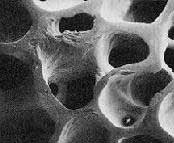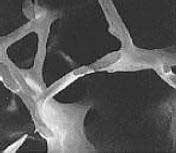OSTEOPOROSIS: AN EXAMINATION OF THE CONDITION
If you have had a Bone Density test utilizing the latest advances in DXA technology, which can give accurate results and according to the classification system developed by the World Health Organization, and your T- Score was below -2.5, this has put you in a statistical category that shows you should be VERY concerned with your bone density. The World Health Organization states that a T-Score of anything below -2.5 is in the range of "Osteoporosis." This puts you at HIGH risk for bone fractures, which could compromise your quality of life and could lead to other complications. We recommend that you take some proactive measures that will not only stop further bone density loss, but may actually improve your bone density and strength.

Strong, normal bone (above); Bone weakened by osteoporosis (below) 
The following recommendations are based on research done by the National Osteoporosis Foundation. NWC Naturals® has outlined the following three-prong, natural approach to help you improve your bone health.
NUTRITION:
Calcium is essential for healthy bones. It is very important to increase calcium intake by eating foods that are high in calcium. We also recommend that you avoid foods or eating habits that deplete calcium, including:
- Carbonated Beverages of Any Kind
- High Protein Diets
- Prescription Drugs
- High Fat Diets
- Drinking Alcohol
- Coffee
- Table Salt
- Junk Foods High in Preservatives
- Salt
- White Sugar
- White Flour
- Caffinated foods
The following is a list of the foods that contain high amounts of calcium. You should make a conscious effort to include 800 milligrams of calcium from these foods every day, in addition to the calcium you may already be getting from other foods.
| Food Item | Calcium Content | Food Item | Calcium Content |
| Yogurt Plan Low fat 1 cup |
400 mg | Spinach 1/2 cup |
100 mg/ |
| Skim milk 2% 1 cup |
300 mg | Orange 1 Ave. |
50 mg. |
| Salmon 6 oz |
360 mg | Molasses 1 Tblsp |
140 mg |
| Almonds 1 oz |
70 mg | Swiss Cheese 1 oz |
270 mg |
| Corn Tortilla 2 Ave. |
120 mg | Total-Nutrition Program™ | 333 mg |
EXERCISE:
Perform only low-impact aerobic exercises, 3 to 4 times a week for 30 minutes and a strength-training program, 3 times a week for 30 minutes. Working with a personal trainer is highly recommended for your resistance training. (DO NOT perform high-impact exercises at all)
Types of Exercise
High impact aerobics
Jogging, Walking, Stair climbing, Dancing
Low impact aerobic
Swimming, Indoor cycling, Stretching
Resistance training
Strength training with weights
SUPPLEMENTATION:
Take Two Daily-Cal ™ capsules three times a day preferably with meals. Daily-Cal™, the only product on the market that combines the most absorbable form of calcium, magnesium, zinc, copper, manganese and boron (all of which are patented, amino acid chelates) with vitamin D from Shitake Mushroom and the only known nutrient to increase bone mineral density, Soy Isoflavones. These Isoflavones are delivered 200% better with our L.E.A.D.S.® Live Enzyme Activated Delivery System ®. Along with Ultra-Cal 1000™, we recommend that you supplement your diet with Ultra-Enzyme Support® to support digestion and delivery of nutrients in your system. We also recommend one serving a day of Total-Nutrition Program™ to replenish all other vital nutrients as well as supplying 333-mg. of chelated Calcium.
Remember with osteoporosis the bones do not feel pain.
With out proper testing you will not know anything is wrong until something BREAKS!


